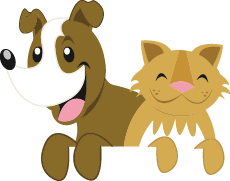Giving Thanks!
This time of year we pause to give thanks for all the wonderful things in our lives. For so many of us, we are thankful for our beloved animals. Therefore, it only makes sense that we would want to keep them as healthy and safe as possible. However, with every major holiday, there are unforeseen hazards that can cause serious problems for our pets. Therefore, this Thanksgiving, here are a few things to keep in mind.
First and foremost, there is the aromatic, juicy turkey that we all love to eat on Thanksgiving. Well, this probably is not a news flash, but our pets love to consume turkey as well. And while a little nibble of turkey won’t necessarily cause any issues with your pet, you should be cautious. First, be sure that the turkey is cooked all the way through. This will save your pet (and your family) from inadvertently ingesting any salmonella bacteria. Second, be sure that if you do give any turkey to your pet, there are absolutely no bones in it. Bones can easily lodge in the esophagus, stomach or intestines. They can also splinter causing infection, blockages and even death if not treated. Your best course of action is to avoid giving your pets scraps, but we understand that this does happen. So, just be careful.
Avoid giving your pets (or letting them get at) any foods that are high in fat content. This includes the skin from the turkey, gravy and any beef fat that you may be using. These high fat foods can cause severe gastrointestinal issues in pets. This includes vomiting, diarrhea, gas, bloat and even pancreatitis.
When making the stuffing, be careful about what herbs you are using. They may be tasty to you, but toxic to your pet. Sage in particular is one that can cause gastrointestinal problems in your animals. Cats are particularly sensitive to essential oils and herbs, so watch them around the stuffing.
Be careful of the packing that the food comes in. Nosing through the trash that smells so delightful, your dog or cat might think that they have found a treasure chest of goodies. Unfortunately, when consumed, those plastic bags, strings and other items can cause serious issues and even death for your pet.
Finally, once the meal is over and dessert is served, keep Fifi and Fido away. Chocolate, in particular is very toxic to dogs. However, most of the decadent and rich desserts we eat on Thanksgiving will not settle well with your animals. Just say no when it comes to letting them sample the dessert.
We want to keep our holidays festive and fun and an emergency trip to the vet does not factor into these plans! So, keep an eye on your pets, keep the food out of reach and have a very Happy Thanksgiving!
By Amanda Bala on November 25th, 2013 in Pet Care

